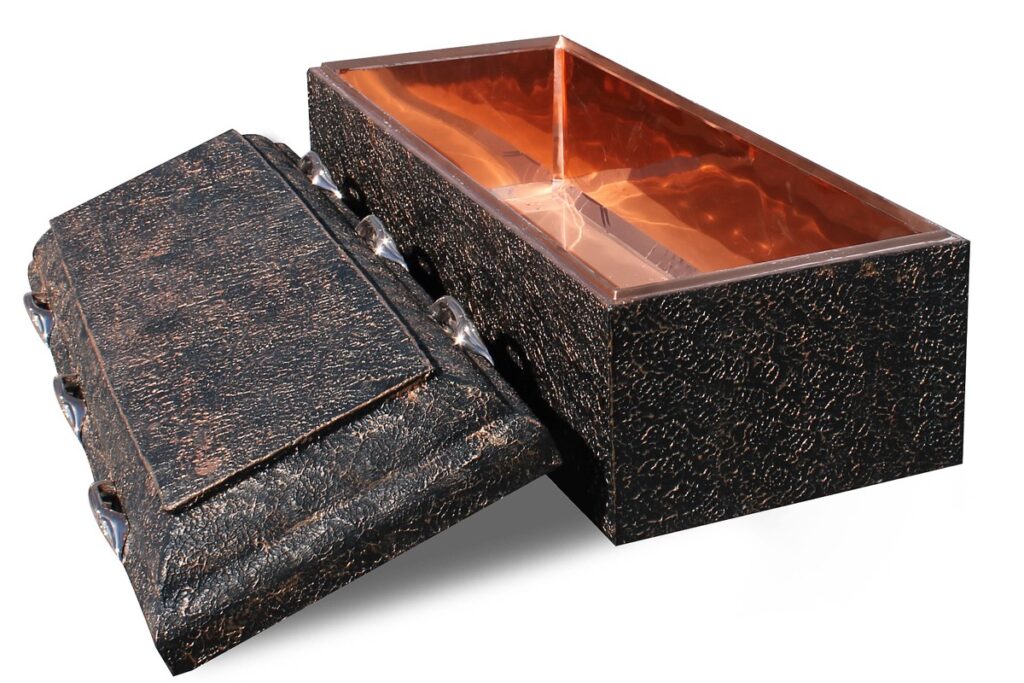A burial vault is a protective container, typically made of concrete, metal, or plastic, that surrounds the casket in a grave. Its primary purpose is to provide structural support and protect the casket from the weight of the earth and heavy equipment used during burial. Additionally, burial vaults help prevent grave settling, preserving the appearance and stability of the gravesite over time.
Though burial vaults are placed underground and not visible during burial, they play a critical role in maintaining the integrity of the casket and the surrounding ground.
Types of Burial Vaults
Burial vaults come in different materials and designs, each offering varying levels of protection:
- Concrete Vaults: These are the most common type, often reinforced with steel or plastic liners to provide added strength and water resistance.
- Metal Vaults: Typically made from steel, copper, or bronze, these vaults are more expensive but chosen for their durability and resistance to corrosion.
- Plastic or Composite Vaults: These are made from durable plastic or composite materials. They are lightweight, less costly, and provide adequate protection.
Why Are Burial Vaults Used?
Burial vaults serve multiple purposes, most of which are required by cemeteries:
- Grave Stability: Without a vault, the soil above the casket can shift over time, causing the ground to sink. Burial vaults prevent this issue.
- Cemetery Maintenance: Vaults help preserve the aesthetic appearance of the cemetery by preventing the ground from collapsing or becoming uneven.
- Casket Protection: Burial vaults provide an additional layer of protection for the casket, shielding it from soil pressure, moisture, and other environmental factors.
Burial Vault Costs in the U.S. and Canada
The cost of burial vaults varies based on the material, design, and location. Here’s a breakdown of typical burial vault prices in both countries:
- United States:
- Basic concrete vaults range from $900 to $3,000.
- Premium options, such as metal or fully customized vaults, can cost between $5,000 to $10,000 or more.
- Canada:
- Basic concrete vaults typically range from CAD 1,200 to CAD 4,000.
- Higher-end metal vaults or customized options may range from CAD 6,000 to CAD 12,000.
Vault prices can vary depending on region, cemetery policies, and the materials used, so it’s always recommended to check local prices and options.
Environmental Impact of Burial Vaults
While burial vaults serve important functions, their environmental impact is worth considering. Concrete and metal vaults require significant resources to produce, and the energy-intensive manufacturing process contributes to carbon emissions. Additionally, vaults do not break down naturally, remaining in the ground for centuries, unlike caskets that biodegrade more quickly.
For families seeking more environmentally friendly burial options, green or natural burial practices can be an alternative that avoids the use of vaults altogether.
Do You Have to Use a Burial Vault?
Burial vaults are not legally required in every region of the U.S. and Canada, but many cemeteries enforce their use for practical reasons related to the upkeep of their grounds. If a cemetery does not mandate a vault, a simpler and less expensive option like a grave liner—a less protective, but still structurally supportive, alternative to a vault—may be used.
Customization and Personalization of Burial Vaults
Many families choose to personalize burial vaults to honor their loved ones. Customizations may include:
- Engraving: Names, dates, or personal messages can be etched into the vault.
- Decorative Finishes: Some vaults come with polished finishes or decorative elements that add visual appeal.
- Color Choices: Certain vault manufacturers offer color options, allowing families to choose a vault that reflects personal preferences or symbolism.
While these enhancements increase the cost of the vault, they allow for more personal tributes in the burial process.
Alternatives to Burial Vaults
For those looking for alternatives to traditional burial vaults, there are several options:
- Green or Natural Burials: These eco-friendly burials avoid using vaults and embalming, allowing the body to decompose naturally. They are typically conducted in designated green burial grounds.
- Cremation: Cremated remains generally do not require a vault unless they are being buried in a traditional cemetery plot.
- Aquamation (Alkaline Hydrolysis): This water-based process is an alternative to traditional cremation. If the remains are buried, they do not typically require a vault, though some cemeteries may have regulations.
Comparison: Burial Vaults vs. Grave Liners
While burial vaults fully encase the casket and offer significant protection against elements like water and soil pressure, grave liners provide only partial protection. Grave liners are open at the bottom, allowing the casket to rest directly on the soil. They prevent grave collapse, but they do not offer the same level of casket preservation as burial vaults.
Grave liners are a more affordable option, often used when cemeteries don’t require full burial vaults but still want to ensure the stability of the gravesite.
Regulatory Differences in the U.S. and Canada
In the U.S. and Canada, regulations around burial vaults vary by state, province, and cemetery. While vaults are not always legally required, most cemeteries mandate them to protect the integrity of their grounds. Families should check with individual cemeteries for specific requirements before purchasing a burial vault or grave liner.







